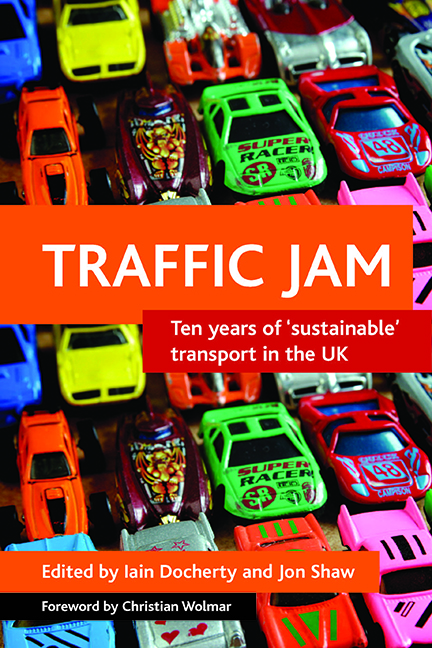Book contents
- Frontmatter
- Dedication
- Contents
- List of tables, figures and boxes
- Foreword
- Preface and acknowledgements
- List of acronyms
- Notes on contributors
- Part One Policy and politics
- Part Two Progress in policy implementation
- Part Three Ten years since A new deal for transport – signposts to the UK’s transport future?
- Index
four - Is Labour delivering a sustainable railway?
Published online by Cambridge University Press: 21 January 2022
- Frontmatter
- Dedication
- Contents
- List of tables, figures and boxes
- Foreword
- Preface and acknowledgements
- List of acronyms
- Notes on contributors
- Part One Policy and politics
- Part Two Progress in policy implementation
- Part Three Ten years since A new deal for transport – signposts to the UK’s transport future?
- Index
Summary
On one level, the railways under New Labour seem a runaway success. In the 10 years since the administration took control, passenger kilometres carried by the national rail network have increased by over 40% and freight tonne kilometres have increased by more than 70% (ORR, 2007). Yet this does not seem consistent with the continual reforms to the industry that have been undertaken by the government. The 2000 Transport Act provided the legal basis for the establishment of the Strategic Rail Authority (SRA), while Transport 2010: The 10-year plan (DETR, 2000) established performance targets and investment levels for rail (see Shaw and Farrington, 2003). These reforms were undermined by a serious accident at Hatfield, north of London, in October 2000 and the subsequent deterioration of infrastructure performance, increases in rail costs and the failure of Railtrack and around one-half of the franchised passenger train operators. This led to a further period of introspection for the railways that has included two White Papers (2004 and 2007), a Railways Act (2005) and the abolition of the ill-fated SRA. At the end of this period the concept of sustainability has become more firmly entrenched in the rail industry's psyche, as epitomised by the title of the 2007 White Paper Delivering a sustainable railway (DfT, 2007a). I argue in this chapter, though, that the emphasis on sustainability largely reflects the government's desire to achieve financial stability and is less about achieving broader economic, social and environmental goals. As a result, the longstanding tensions between commercial and social objectives in the rail sector have not been explicitly recognised and these may provide the fault lines that will necessitate further change in years to come.
The railway under New Labour
As Wolmar (2007) has pointed out, the strained relationship between the railways and the state is almost as old as the railways themselves. The privatisation idealists of the early 1990s thought they might solve this problem by reducing the role of government, but in many ways the new regime that was established by the 1993 Railways Act actually increased the role of the state (Shaw, 2000).
- Type
- Chapter
- Information
- Traffic JamTen Years of 'Sustainable' Transport in the UK, pp. 75 - 96Publisher: Bristol University PressPrint publication year: 2008



